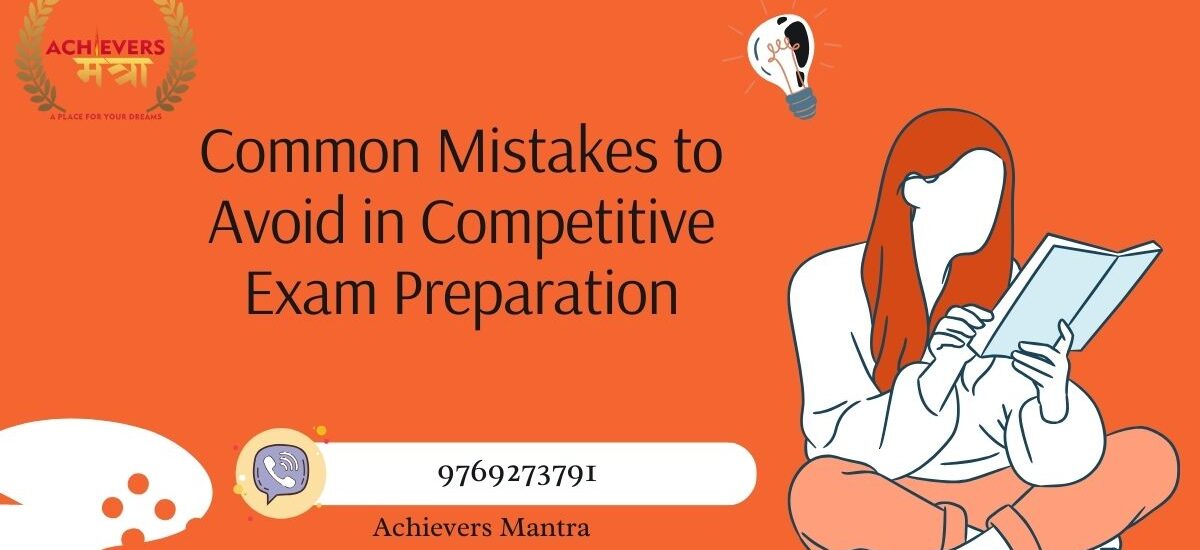Common Mistakes to Avoid in Competitive Exam Preparation- Preparing for competitive exams is a pivotal step towards achieving academic and career goals. However, navigating the complexities of exam preparation can be daunting, especially when faced with common pitfalls that hinder progress. In this comprehensive guide, we delve into the critical topic of Common Mistakes to Avoid in Competitive Exam Preparation. By identifying and addressing these pitfalls proactively, aspirants can optimize their preparation efforts and increase their chances of success in competitive exams. Let’s embark on this journey together, as we uncover key insights and strategies to overcome common challenges and excel in exam preparation.
Also Check: Navigating the Road to Law School: A Comprehensive Guide
Lack of Proper Planning
Effective planning is the cornerstone of successful exam preparation. Without a structured study plan and timeline, aspirants may find themselves overwhelmed and directionless. In this section, we’ll explore the importance of proper planning and provide actionable tips for creating a study schedule that maximizes productivity and efficiency.
Importance of a Structured Study Plan: A structured study plan serves as a roadmap for exam preparation, guiding aspirants through the vast array of topics and concepts to be covered. We’ll discuss how a well-designed study plan helps in organizing study sessions, setting realistic goals, and ensuring comprehensive coverage of the exam syllabus.
Consequences of Studying Haphazardly: Studying haphazardly, without a clear plan or strategy, can lead to inefficiency, stress, and suboptimal results. We’ll highlight the negative consequences of lackluster planning, such as incomplete syllabus coverage, inconsistent study sessions, and last-minute cramming.
Tips for Creating an Effective Study Schedule: We’ll offer practical tips for creating an effective study schedule that aligns with individual learning styles, preferences, and commitments. From allocating specific time slots for each subject to incorporating regular breaks and review sessions, these tips will empower aspirants to structure their study routine for maximum effectiveness.
By prioritizing proper planning and implementing a structured study schedule, aspirants can lay a strong foundation for successful exam preparation. In the next section, we’ll tackle another common pitfall: procrastination, and explore strategies for overcoming this challenge.
Procrastination: Overcoming the Temptation
In this section, we confront the pervasive issue of procrastination in exam preparation, offering insights and strategies to overcome this common obstacle.
Understanding Procrastination: Procrastination, the act of delaying tasks despite knowing their importance, can derail even the most well-intentioned study plans. We’ll delve into the psychology behind procrastination, exploring its underlying causes and its detrimental effects on exam preparation.
Negative Impact on Productivity: We’ll discuss the detrimental impact of procrastination on productivity, including increased stress levels, decreased motivation, and subpar performance in exams. By procrastinating, aspirants risk falling behind schedule and compromising their chances of success.
Strategies for Overcoming Procrastination: Armed with knowledge and awareness, aspirants can employ effective strategies to overcome procrastination and stay on track with their study goals. From breaking tasks into smaller, manageable chunks to setting deadlines and accountability mechanisms, we’ll offer practical tips to combat procrastination effectively.
Cultivating Self-Discipline and Motivation: Building self-discipline and cultivating intrinsic motivation are essential components of overcoming procrastination. We’ll explore techniques for fostering self-discipline, such as setting clear goals, creating a conducive study environment, and practicing mindfulness and self-awareness.
By acknowledging the pitfalls of procrastination and implementing strategies to overcome it, aspirants can reclaim control of their study routine and make steady progress towards their exam goals. In the subsequent section, we’ll address another common mistake: ignoring the exam pattern and syllabus.
Also Check: What are the key components of the CAT exam?
Ignoring Exam Pattern and Syllabus: A Costly Oversight
In this section, we emphasize the critical importance of understanding the exam pattern and syllabus for effective preparation.
Significance of Exam Pattern and Syllabus: Understanding the exam pattern and syllabus is fundamental to crafting a targeted study plan and optimizing preparation efforts. We’ll discuss how overlooking these aspects can lead to inefficient study strategies and inadequate syllabus coverage.
Consequences of Neglecting Exam Structure: Neglecting to familiarize oneself with the exam pattern and syllabus can have dire consequences, including surprise at the format of the exam, inadequate preparation for certain sections, and suboptimal time management during the exam.
Tips for Analyzing Exam Pattern and Syllabus: We’ll provide actionable tips for analyzing the exam pattern and syllabus, including reviewing past question papers, consulting official exam guidelines, and seeking guidance from mentors or peers. By gaining a comprehensive understanding of the exam structure, aspirants can tailor their preparation to align with the exam’s requirements.
Tailoring Preparation Accordingly: Armed with insights into the exam pattern and syllabus, aspirants can tailor their preparation strategies to focus on areas of strength and address areas of weakness. We’ll discuss how aligning study efforts with the exam’s structure can enhance efficiency and effectiveness in preparation.
By prioritizing a thorough understanding of the exam pattern and syllabus, aspirants can position themselves for success and avoid the pitfalls of inadequate preparation. In the next section, we’ll address another common mistake: overlooking the importance of practice and revision.
Overlooking Practice and Revision: Keys to Mastery
In this pivotal section, we delve into the critical importance of regular practice and revision in the journey towards exam success.
The Power of Practice: Practice is the cornerstone of mastery in any field, and exam preparation is no exception. We’ll highlight the significance of regular practice in solidifying concepts, honing skills, and building confidence for exam day.
Consequences of Neglecting Practice and Revision: Neglecting practice and revision can have dire consequences, including inadequate retention of information, poor time management during exams, and increased anxiety levels. We’ll discuss how overlooking these crucial aspects can compromise performance.
Incorporating Practice into the Study Routine: We’ll offer practical tips for incorporating regular practice sessions into the study routine, including solving practice questions, taking mock tests, and engaging in active recall techniques. By integrating these activities into their study schedule, aspirants can reinforce learning and track their progress effectively.
The Importance of Revision: Revision plays a pivotal role in consolidating learning and reinforcing concepts. We’ll discuss the benefits of regular revision sessions, including improved retention, enhanced understanding, and increased confidence in one’s knowledge and abilities.
By prioritizing regular practice and revision, aspirants can fortify their preparation efforts and approach exams with confidence and competence. In the subsequent section, we’ll tackle another common mistake: neglecting health and well-being during the preparation period.
Also Check: How important is mock testing in CAT preparation?
Neglecting Health and Well-being: Achieving Balance Amidst Preparation
In this section, we emphasize the importance of maintaining physical and mental well-being during the demanding preparation period for competitive exams.
The Toll of Neglecting Health: Neglecting health and well-being amidst exam preparation can have serious repercussions, including increased stress levels, decreased immunity, and burnout. We’ll discuss how prioritizing self-care is not only essential for overall well-being but also crucial for optimizing study performance.
Impact on Cognitive Function: We’ll explore how factors such as inadequate sleep, poor nutrition, and lack of exercise can impair cognitive function, leading to decreased concentration, memory retention, and problem-solving abilities. By neglecting health, aspirants risk undermining their exam preparation efforts.
Strategies for Prioritizing Self-care: We’ll provide practical strategies for prioritizing self-care amidst the rigors of exam preparation, including establishing a healthy sleep routine, nourishing the body with nutritious meals, staying physically active, and incorporating relaxation techniques such as meditation or mindfulness.
Managing Stress Effectively: Stress is an inevitable part of exam preparation, but it’s essential to manage it effectively to prevent it from becoming overwhelming. We’ll discuss techniques for managing stress, such as deep breathing exercises, time management strategies, and seeking social support when needed.
By prioritizing health and well-being alongside exam preparation, aspirants can ensure that they are in the best possible state to perform at their optimal level on exam day. In the conclusion, we’ll summarize key takeaways and offer final words of encouragement.
Conclusion: Common Mistakes to Avoid in Competitive Exam Preparation
In this concluding section, we summarize the key insights gleaned from our exploration of common mistakes to avoid in competitive exam preparation and offer final words of encouragement to aspirants.
Reflecting on Key Insights: We reflect on the critical importance of identifying and mitigating common mistakes in exam preparation, highlighting the detrimental impact these pitfalls can have on performance and success. By addressing these challenges proactively, aspirants can enhance their preparation efforts and increase their chances of success.
Embracing Strategic Preparation: Strategic preparation is the key to success in competitive exams. By prioritizing proper planning, overcoming procrastination, understanding exam patterns and syllabi, incorporating regular practice and revision, and prioritizing health and well-being, aspirants can optimize their preparation efforts and approach exams with confidence and competence.
Charting a Path Forward: Aspirants are encouraged to leverage the insights gained from our exploration of common mistakes to avoid, crafting a personalized preparation strategy that aligns with their goals, preferences, and aspirations. With dedication, perseverance, and strategic planning, success in competitive exams is within reach.
In closing, we extend our best wishes to all aspirants as they embark on their exam preparation journey. Remember, each challenge presents an opportunity for growth, and with determination and resilience, you can overcome obstacles and achieve your academic and career goals. Best of luck!






